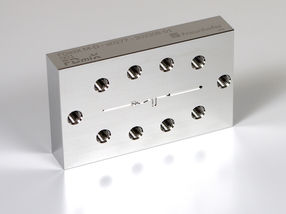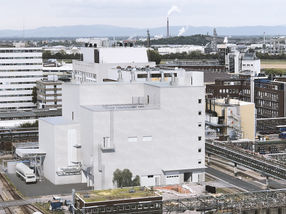Süd-Chemie and Linde launch production of climate-friendly biofuels
Süd-Chemie AG and The Linde Group have launched the production of climate-friendly biofuels based on lignocellulosic biomass in Munich.
In the presence of the EC Commissioner for Energy and Transport, Andris Piebalgs, and the Bavarian Minister of Economics, Infrastructure, Transport and Technology, Martin Zeil, a pilot plant was officially opened at Süd-Chemie's research centre in Munich-Obersendling on 27 April 2009. This pilot plant will be using cereal straw to manufacture up to two tons of bioethanol fuel annually.
The process developed by Süd-Chemie and Linde allows biofuels, such as ethanol, to be extracted from plant matter containing cellulose, for instance wheat straw or maize straw, with the aid of enzymes created using biotechnological methods. The partners in this currently unique alliance offer excellent mutual benefits. Whereas Süd-Chemie´s expertise lies in the sectors of biocatalysis and bioprocess engineering, Linde's subsidiary, Linde-KCA-Dresden, offers experience in implementing chemical and biotechnological processes on a commercial scale. Compared with the first-generation biofuels already in use today, such as biodiesel made from rapeseed oil, these second-generation biofuels according to experts offer a significant improvement in terms of climate and energy balances, including higher potential for reducing CO2 emissions. In addition, second-generation biofuels do not compete with the cultivation of either food or animal feed.
The EC Commission is expecting second-generation biofuels to make a key contribution to its sustainable energy policy. These biofuels represent a form of renewable energy that can be used to reduce our high dependence on oil on a lasting basis, especially in the transport sector. The new legislation package to implement the EC's climate and energy policy therefore specifically promotes second-generation biofuels.
The pilot plant now opened represents a scaled-down version of the entire integrated manufacturing process required to convert straw into bioethanol. Construction of a larger demonstration plant producing several thousand tons of bioethanol each year is due to commence in the near future. Bavarian Economics Minister Zeil said: "Biofuels are a topic of enormous future significance. The pilot plant is an important step forward toward a 'biorefinery', in which renewable plant-based raw materials are being converted to valuable base chemicals using modern biotechnological methods. Ideally, the whole plant may be utilized in these processes."
Following this step, marketable large-scale plants for the commercial production of second-generation biofuels from cereal straw and other cellulosic residue will be within reach. A competent partnership will be available to assist potential customers, including ethanol manufacturers, companies active in the petroleum industry, or other enterprises in the industrial and agricultural sectors, as well as investors, in planning and constructing these plants on a worldwide scale.
Most read news
Topics
Organizations
Other news from the department manufacturing

Get the life science industry in your inbox
By submitting this form you agree that LUMITOS AG will send you the newsletter(s) selected above by email. Your data will not be passed on to third parties. Your data will be stored and processed in accordance with our data protection regulations. LUMITOS may contact you by email for the purpose of advertising or market and opinion surveys. You can revoke your consent at any time without giving reasons to LUMITOS AG, Ernst-Augustin-Str. 2, 12489 Berlin, Germany or by e-mail at revoke@lumitos.com with effect for the future. In addition, each email contains a link to unsubscribe from the corresponding newsletter.






















































